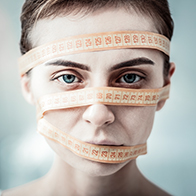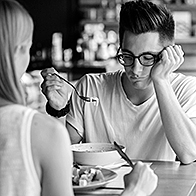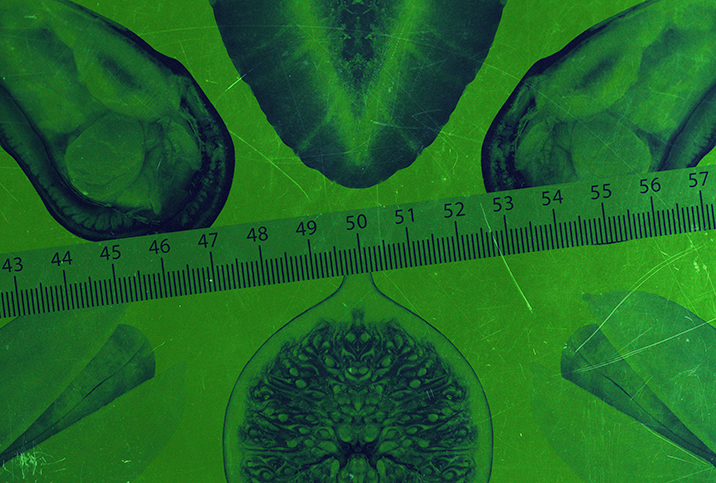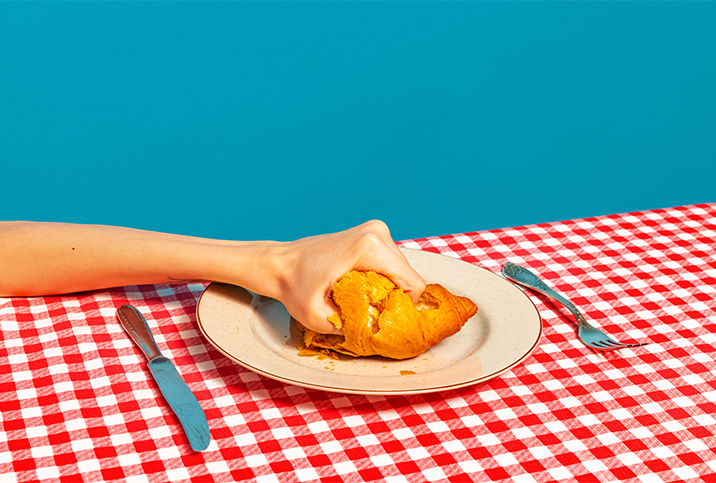Dating With an Eating Disorder
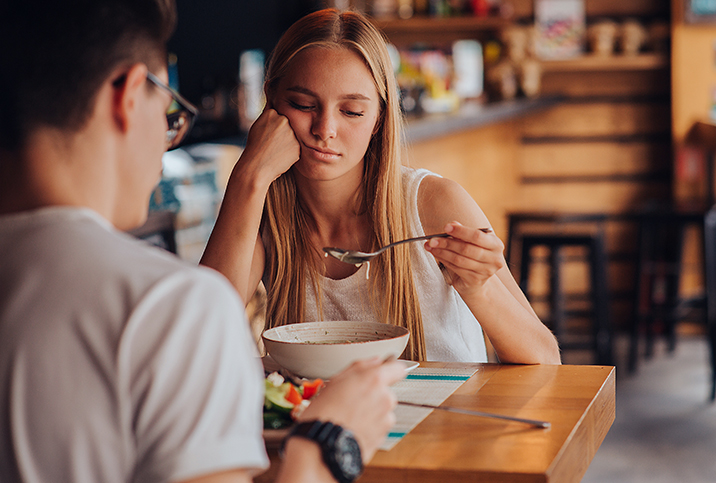
When I studied abroad in Buenos Aires, Argentina, during my junior year of college, my boyfriend of one year and my eating disorder of two came with me. The three of us rented a dingy, 400-square-foot apartment in the city center.
If Mark was aware that I was two-timing him with a mental illness, he didn't show it. We were both busy memorizing subtle subway routes, buying calling cards for home and generally feeling overwhelmed by the buzzy, sprawling South American metropolis, where we didn't know anyone or speak the language.
In unfamiliar terrain, I turned to a familiar coping mechanism: food, or rather, the lack of it. Starvation, spurred on by a diet of broth and air-popped popcorn, made me paranoid. I became increasingly suspicious of Mark, who I was certain was judging me every time I ate. I started hiding food in my purse and pockets or waiting until he was in the bathroom to scarf something down. However, in our tiny studio, even the bathroom wasn't very private. Thus, on the rare occasions Mark left the apartment, I seized the opportunity to pinch his pizza crusts from the trash so I could eat and throw them up.
I was secretive, food-obsessed, emotionally involved with something else—an eating disorder—and ready to turn on Mark or anyone else who got in our way.
The impact of eating disorders on romantic relationships
The National Association of Anorexia Nervosa and Associated Disorders estimates that about 30 million Americans will experience an eating disorder in their lifetime. Mental illness—which can include anorexia, bulimia and binge eating disorder—can be taxing on intimate relationships, according to Nancy Wilson, L.P.C.S., a psychotherapist in Houston.
"The eating disorder can become your partner or mistress," Wilson said, likening the condition to alcoholism or any other type of addiction. "Your relationship can become secondary.
"If you have an eating disorder, you're probably consumed with your thoughts about food and body," she continued. "Thinking about your body, hating your body, thinking about what you're going to eat later—these kinds of thoughts can be very consuming."
Wilson said the body image issues that accompany eating disorders can translate to problems with physical intimacy.
"People with eating disorders tend to not feel comfortable in their body, and there may be some body dysmorphia," Wilson said. "If you don't trust your body, you don't really want to share it with somebody else, right? If you feel disgusted by your body or unhappy with it, that's not a good recipe for being intimate."
A relationship's role in recovery
As with any addiction, a case can be made for abstaining from dating with an eating disorder until you're in a stable place in your recovery. The thinking goes: You can't have a healthy relationship with someone else without first having a healthy relationship with yourself.
However, research on the romantic partners of people with eating disorders suggests they can play a formative role on the road to recovery. In a 2017 study published in the Journal of Family Psychology, researchers found that involving partners in the treatment process for adults with anorexia nervosa yielded encouraging results, including healthy weight gain, reduced anxiety and depression, and a lower treatment dropout rate.
Generally speaking, methods for treating eating disorders have been moving away from individual therapy to family-based intervention since the early 2000s. Individuals who've recovered from eating disorders report that supportive relationships were integral to their healing.
Wilson emphasized, however, that whether a relationship is harmful or helpful to your eating disorder recovery may depend on the relationship itself.
"If you're in a healthy relationship with a supportive partner, it can be helpful by providing some accountability," she said. "Sometimes it can motivate people to get better just because they really don't want to hurt their partner."
Still, Wilson warned that eating disorders can be used as a coping mechanism for relationship stress.
"If you've ever been in a relationship, you know how stressful even good, loving ones can be," she said. "So if the relationship is causing you a lot of stress, it might actually push you in the other direction."
When and how to discuss an eating disorder with a partner
In the early days of dating, Wilson advocated being discreet about your condition until you know and trust someone.
"If it's a first date, they don't need a résumé of everything you're struggling with," she said.
If and when you're ready to divulge details about your eating disorder to a romantic partner, Wilson recommended requesting a private time to talk. She offered some ideas in terms of a script:
"I would say something like, 'It may be hard for you to understand, but I really just want you to listen and try not to judge me,'" she suggested. "'You know how when some people are stressed, they drink or smoke or go for a run or binge-watch Netflix? When I feel upset, I will sometimes binge-eat food' or 'I will sometimes restrict food' or 'I will sometimes overeat.'"
Wilson recommended keeping explanations brief before opening the floor for questions.
"'I know it's not a very healthy coping mechanism, but it helps me feel better and helps me feel in control," she continued with the script. "'And I want to be honest with you so that you know what's going on and we can talk about it.'"
For partners seeking to be supportive of a loved one with an eating disorder, Wilson advocated being curious and asking questions.
"Ask your partner, 'How can I support you?' and take your cues from them," she said. "But it's also good to encourage them to get professional help from a therapist and a dietitian."
Wilson emphasized that eating disorders take a toll on both partners.
"It's hard to see someone you care about struggle," she said. "If you're in a relationship with someone with an eating disorder, it can feel like a burden to you as well. You need to think about your own self-care and getting help for yourself, too."







